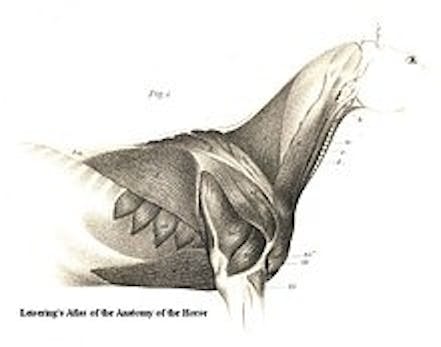
Deltoid info...
What is the deltoid muscle?
The deltoid muscles in horses, as in humans, are a group of shoulder muscles responsible for movement and stability of the shoulder joint. In horses, the deltoid muscle is commonly referred to as the "shoulder muscle" or "shoulder deltoid."
The deltoid muscle in horses consists of three main parts: the cranial (anterior), middle, and caudal (posterior) fibers. These fibers work together to facilitate movement and support the shoulder joint.
The deltoid muscle in horses is involved in various actions, including:
- Shoulder Flexion: The deltoid muscle helps to flex or bring the horse's shoulder forward.
- Shoulder Extension: It assists in extending or moving the shoulder backward.
- Shoulder Abduction: It helps to move the shoulder away from the midline of the horse's body.
- Shoulder Adduction: It assists in bringing the shoulder closer to the midline of the horse's body.
- Stabilisation: The deltoid muscle contributes to the overall stability of the shoulder joint, which is crucial for the horse's movement and balance.
Why is the deltoid muscle important?
Strong deltoid muscles are important for horses involved in activities that require shoulder strength and flexibility, such as jumping, dressage, cutting, and barrel racing. Conditioning exercises, including lunging, hill work, and specific shoulder-strengthening exercises, can help develop and maintain the deltoid muscles in horses.
It's worth noting that while the deltoid muscles play a significant role in shoulder movement, multiple other muscles in the forelimbs and torso of the horse also contribute to the overall function and stability of the shoulder joint.
Here are 2 facts about the deltoid muscle...
Size and Power: The deltoid muscle in horses is one of the largest and most powerful muscles in their body. This muscle group is well-developed to support the horse's weight and provide strength and stability during various movements.
Injury Potential: Due to the deltoid muscle's prominent role in shoulder movement and stability, it is susceptible to strain and injury, particularly in horses involved in intense physical activities or those who experience repetitive stress. Proper warm-up exercises, regular conditioning, and appropriate rest periods can help reduce the risk of deltoid muscle injuries in horses. Early detection and proper veterinary care are essential in managing and treating deltoid muscle injuries to ensure the horse's optimal recovery.
Musculus deltoideus:
The deltoid muscle is a lateral muscle of the shoulder. Its origin are divided in three parts (two parts in horses because there is no acromion): Scapular part: from scapular spine to the deltoid tuberosity. Acromial part: from acromion to deltoid tuberosity.



